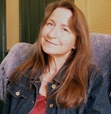Nancy Butts's Blog, page 6
May 10, 2013
While the mice are away...the writer will play
I am going to have the house to myself for 72 glorious hours, so I am racing around this morning trying to get all my chores and errands done; I want to free up every moment of that time to write! For me, this is the best vacation—having the rare solitude to work on my book, a middle grade novel that is my twisted spin on ghosts and haunted houses.
This is the book I've wanted to write since I was eleven, and my father gave me a copy of Shirley Jackson's The Haunting of Hill House . In my book, Spontaneous Combustion , I share this wondrous first paragraph of Jackson's novel.
“No live organism can continue for long to exist under conditions of absolute reality; even larks and katydids are supposed, by some, to dream. Hill House, not sane, stood by itself against its hills, holding darkness within; it had stood so for eighty years and might stand for eighty more. Within, walls continued upright, bricks met neatly, floors were firm, and doors were sensibly shut; silence lay steadily against the wood and stone of Hill House, and whatever walked there, walked alone.”
I can only hope to write something this good, but that's my inspiration for the weekend.
That is, if my dog lets me. A gruesome growth appeared overnight on his face yesterday, looking like a hitherto-unknown species of ginormous tick, or a part of his brain extruding through his Newfish fur. Ugh! It doesn't seem to be causing him pain, and he's not acting sick, but still I'm worried. Of course the vet was closed, but with a huge sigh I made an appointment for today. There goes my writing sabbatical, I thought. I'm going to be nursing a 130-pound dog after cranial surgery instead.
But there's hope! As of this morning, the growth seems to be deflating like some kind of disgusting balloon. So maybe it was just a hematoma; poor Yukon might have gotten bitten by something, or scratched his face when he was nosing around the honeysuckle and getting stuck in my neighbor's bamboo plantation. I'm crossing my fingers that it will heal on his own, I can cancel the vet appointment, and Yukon can go back to being my Muse for my weekend of writing.
Wish us both luck!
This is the book I've wanted to write since I was eleven, and my father gave me a copy of Shirley Jackson's The Haunting of Hill House . In my book, Spontaneous Combustion , I share this wondrous first paragraph of Jackson's novel.
“No live organism can continue for long to exist under conditions of absolute reality; even larks and katydids are supposed, by some, to dream. Hill House, not sane, stood by itself against its hills, holding darkness within; it had stood so for eighty years and might stand for eighty more. Within, walls continued upright, bricks met neatly, floors were firm, and doors were sensibly shut; silence lay steadily against the wood and stone of Hill House, and whatever walked there, walked alone.”
I can only hope to write something this good, but that's my inspiration for the weekend.
That is, if my dog lets me. A gruesome growth appeared overnight on his face yesterday, looking like a hitherto-unknown species of ginormous tick, or a part of his brain extruding through his Newfish fur. Ugh! It doesn't seem to be causing him pain, and he's not acting sick, but still I'm worried. Of course the vet was closed, but with a huge sigh I made an appointment for today. There goes my writing sabbatical, I thought. I'm going to be nursing a 130-pound dog after cranial surgery instead.
But there's hope! As of this morning, the growth seems to be deflating like some kind of disgusting balloon. So maybe it was just a hematoma; poor Yukon might have gotten bitten by something, or scratched his face when he was nosing around the honeysuckle and getting stuck in my neighbor's bamboo plantation. I'm crossing my fingers that it will heal on his own, I can cancel the vet appointment, and Yukon can go back to being my Muse for my weekend of writing.
Wish us both luck!
Published on May 10, 2013 07:03
May 6, 2013
Reluctant convert to e-readers
Normally it's hot and sunny in the part of the world where I live, but for the past few days it's done little but blow chilly gusts of rain. So Saturday I allowed myself a treat in which I haven't indulged for far too long: I actually spent the entire day reading—bliss! I finished a YA fantasy by Cornelia Funke entitled
Reckless
. It's the first in a trilogy; the second installment,
Fearless
, was just released. And I also read a book for lay readers by philosopher Stephen Cave called
Immortality
.
Both were library books; I am so grateful for the wonderful inter-library loan system in my state. I can sit at my computer, order books, and then walk the four blocks down to the local library to pick them up when they arrive. And did I mention this is free?
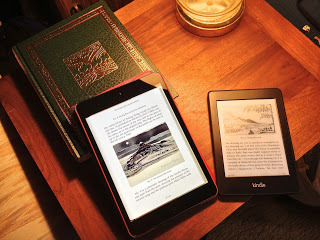 Three versions of The Hobbit: Hardcover (l), iPad Mini, and Kindle Paperwhite
Three versions of The Hobbit: Hardcover (l), iPad Mini, and Kindle Paperwhite
But slowly over the past eighteen months I have shifted more of my reading to the digital realm. My neck surgery last Halloween accelerated that process. When I was recovering from the operation on my cervical spine last fall, I wasn't allowed to bend my neck forward for even five minutes to read a paper book. So I started buying e-books, loading them on my iPad Mini, and propping that up at eye level so I could keep reading. And to my surprise, I actually liked the experience.
Why did that shock me? Because all my previous experiments with e-readers had failed miserably. Despite being a consummate geek, I didn't like the digital reading experience. I missed the heft and smell of a real book in my hands, especially a beautifully-designed and bound hardcover one. I felt disconnected from digital books, as if they weren't real.
I had tried three different Kindle models—the Kindle 3 with keyboard, the so-called Kindle Lite, and the Kindle Touch—and returned them all within 30 days. The screens were hard to read in the dim light of my 1880s-era Victorian house, and it was awkward and difficult to do simple things like turn pages. I also tried the full-sized iPad, but it was too big and heavy to hold for my marathon reading sessions.
But then I got my iPad Mini, with a leather cover that makes it look and handle like a book, and my resistance to digital books faded. I love the backlit screen, which allows me to read anywhere, anytime—even outside in the shade. All other reports to the contrary, the LCD screen doesn't tire my eyes at all, and the contrast and clarity far outstrip anything that e-ink readers like Kindle or Nook have on offer. I also like that the Mini displays books in color: far more like the "real thing."
So over the past seven months since I got my Franken-neck, I'm now doing about half my reading digitally. I was so inspired I even wrote my first Kindle book: Spontaneous Combustion . And last week I welcomed the Kindle Paperwhite into my home. I was prepared to send it right back, given my previous experience, but this one is a keeper. Though I still prefer the iPad Mini, the Paperwhite's backlit screen finally has enough light and contrast to be readable by my LASIK-ed eyes: and it's a joy to read in the bright sunshine. Since I do a lot of my reading outside in the backyard—when it isn't raining, that is—this is essential. Amazon got the software right this time, too; I find the Paperwhite much more intuitive to use than its older siblings, though still nowhere near as easy as iBooks on the iPad Mini.
Though of course no digital device is going to make reading as straightforward as it is on a paper book. What could be easier than simply turning the pages?
Besides, to me, a physical book is a treasure, something to cherish. That's why I own four different hardcover versions of The Hobbit, for example; I do that with many books. I'm never going to feel that way about a digital book file on an e-reader. So I'll continue to download books to my Mini and Paperwhite to read, but when I find a title that I love, I'm still going to buy a hardcover version, the more elegantly-bound the better.
Time to get another bookshelf!
Both were library books; I am so grateful for the wonderful inter-library loan system in my state. I can sit at my computer, order books, and then walk the four blocks down to the local library to pick them up when they arrive. And did I mention this is free?
 Three versions of The Hobbit: Hardcover (l), iPad Mini, and Kindle Paperwhite
Three versions of The Hobbit: Hardcover (l), iPad Mini, and Kindle PaperwhiteBut slowly over the past eighteen months I have shifted more of my reading to the digital realm. My neck surgery last Halloween accelerated that process. When I was recovering from the operation on my cervical spine last fall, I wasn't allowed to bend my neck forward for even five minutes to read a paper book. So I started buying e-books, loading them on my iPad Mini, and propping that up at eye level so I could keep reading. And to my surprise, I actually liked the experience.
Why did that shock me? Because all my previous experiments with e-readers had failed miserably. Despite being a consummate geek, I didn't like the digital reading experience. I missed the heft and smell of a real book in my hands, especially a beautifully-designed and bound hardcover one. I felt disconnected from digital books, as if they weren't real.
I had tried three different Kindle models—the Kindle 3 with keyboard, the so-called Kindle Lite, and the Kindle Touch—and returned them all within 30 days. The screens were hard to read in the dim light of my 1880s-era Victorian house, and it was awkward and difficult to do simple things like turn pages. I also tried the full-sized iPad, but it was too big and heavy to hold for my marathon reading sessions.
But then I got my iPad Mini, with a leather cover that makes it look and handle like a book, and my resistance to digital books faded. I love the backlit screen, which allows me to read anywhere, anytime—even outside in the shade. All other reports to the contrary, the LCD screen doesn't tire my eyes at all, and the contrast and clarity far outstrip anything that e-ink readers like Kindle or Nook have on offer. I also like that the Mini displays books in color: far more like the "real thing."
So over the past seven months since I got my Franken-neck, I'm now doing about half my reading digitally. I was so inspired I even wrote my first Kindle book: Spontaneous Combustion . And last week I welcomed the Kindle Paperwhite into my home. I was prepared to send it right back, given my previous experience, but this one is a keeper. Though I still prefer the iPad Mini, the Paperwhite's backlit screen finally has enough light and contrast to be readable by my LASIK-ed eyes: and it's a joy to read in the bright sunshine. Since I do a lot of my reading outside in the backyard—when it isn't raining, that is—this is essential. Amazon got the software right this time, too; I find the Paperwhite much more intuitive to use than its older siblings, though still nowhere near as easy as iBooks on the iPad Mini.
Though of course no digital device is going to make reading as straightforward as it is on a paper book. What could be easier than simply turning the pages?
Besides, to me, a physical book is a treasure, something to cherish. That's why I own four different hardcover versions of The Hobbit, for example; I do that with many books. I'm never going to feel that way about a digital book file on an e-reader. So I'll continue to download books to my Mini and Paperwhite to read, but when I find a title that I love, I'm still going to buy a hardcover version, the more elegantly-bound the better.
Time to get another bookshelf!
Published on May 06, 2013 07:29
April 30, 2013
Feeling like Sally Field this morning
"You like me, you really like me!"
That's actually a misquote, but it's how the infamous Academy Award acceptance speech by actress Sally Field is remembered. She was parodied for that in comedy routines everywhere, mocked for her gushing, child-like relief in gaining other people's approval. In my book, Spontaneous Combustion , I write that you cannot depend on anyone else for validation of your writing—that has to come from within yourself. Still, I confess to sounding a lot like Sally Field this morning after seeing this review of my book.
Bodach blog review
What a rush of relief and gratitude I felt on reading this! Vijaya is a fellow writer, ICL teacher, and blogger, one who over the years has become a dear friend. She even offered me the honor of working with her on the edit of the manuscript of her YA novel.
But even friendship doesn't guarantee that anyone else will understand your work. I felt the presence of a "great cloud of witnesses" as I wrote this book, almost hearing a host of writers rustling behind my desk as I typed away. They were the ones I wanted to touch, to buoy them up in their moments of doubt, resistance, and despair. But I didn't know if I had succeeded in doing that; Vijaya's review reassures me that I did.
You can't see it, but I've got a huge smile on my face right now.
That's actually a misquote, but it's how the infamous Academy Award acceptance speech by actress Sally Field is remembered. She was parodied for that in comedy routines everywhere, mocked for her gushing, child-like relief in gaining other people's approval. In my book, Spontaneous Combustion , I write that you cannot depend on anyone else for validation of your writing—that has to come from within yourself. Still, I confess to sounding a lot like Sally Field this morning after seeing this review of my book.
Bodach blog review
What a rush of relief and gratitude I felt on reading this! Vijaya is a fellow writer, ICL teacher, and blogger, one who over the years has become a dear friend. She even offered me the honor of working with her on the edit of the manuscript of her YA novel.
But even friendship doesn't guarantee that anyone else will understand your work. I felt the presence of a "great cloud of witnesses" as I wrote this book, almost hearing a host of writers rustling behind my desk as I typed away. They were the ones I wanted to touch, to buoy them up in their moments of doubt, resistance, and despair. But I didn't know if I had succeeded in doing that; Vijaya's review reassures me that I did.
You can't see it, but I've got a huge smile on my face right now.
Published on April 30, 2013 08:44
April 28, 2013
Writers and boundaries: blogger Kristi Holl's new series
It’s been an exciting but chaotic first week after the launch of my book,
Spontaneous Combustion
. Getting the word out is a challenge, even with all the social media opportunities available. Or maybe I should say especially because of all the social media “targets” one is supposed to hit. There is definitely a blog post in my future on this topic!
But as always, I am overwhelmed and deeply grateful for the outpouring of support from my fellow wizards. The people who write for kids are the most generous folks in the world: no divas or competitive egos here. Many writers immediately bought the book, and are now spreading the word via their blogs and websites. I even got an offer for a free blurb in an e-newsletter for writers, and Kristi Holl asked permission to quote me in her upcoming book.
Which brings me to the point of this post. Kristi has published a couple of books to which I have long referred my ICL students. She also maintains a wonderful blog called “Writers First Aid.” She has recently begun a series there that you should definitely check out. It's about the relationship between a writer's boundaries and her productivity/creativity.
In chapter 6 of my book, I touch upon that, though I call it writer’s malaise. What Kristi does in her series, and also in her new book due out in about a month, is take a new look at the reasons why writers can't or don’t write. It’s a fresh insight into that quandary, one that is making me step back and think about my own boundaries. I think you might find it immensely helpful as well.
But as always, I am overwhelmed and deeply grateful for the outpouring of support from my fellow wizards. The people who write for kids are the most generous folks in the world: no divas or competitive egos here. Many writers immediately bought the book, and are now spreading the word via their blogs and websites. I even got an offer for a free blurb in an e-newsletter for writers, and Kristi Holl asked permission to quote me in her upcoming book.
Which brings me to the point of this post. Kristi has published a couple of books to which I have long referred my ICL students. She also maintains a wonderful blog called “Writers First Aid.” She has recently begun a series there that you should definitely check out. It's about the relationship between a writer's boundaries and her productivity/creativity.
In chapter 6 of my book, I touch upon that, though I call it writer’s malaise. What Kristi does in her series, and also in her new book due out in about a month, is take a new look at the reasons why writers can't or don’t write. It’s a fresh insight into that quandary, one that is making me step back and think about my own boundaries. I think you might find it immensely helpful as well.
Published on April 28, 2013 12:01
April 27, 2013
Midnight in the BBQ of good & evil
The small town where I live has two festivals: one in September to celebrate our past status as the one-time buggy manufacturing capital of the country; and one in April, the BBQ & Blues Festival. So the route I took for my walk this morning was clogged with RVs and cooking trailers, and the air was redolent with the tang of woodsmoke and slow-roasted pork. My Newf Yukon loves it, but then he’s a devoted carnivore. I’m a vegetarian, so there’s not quite so much love on my part. Poor pigs! [Though I do like the blues concert at night.]
The festival is actually part of the competitive barbecue-cooking circuit; who knew there was such a thing? Each team also tries to outdo each other with clever names. Look at the juxtaposition of these two teams, barely a hundred yards from one another.
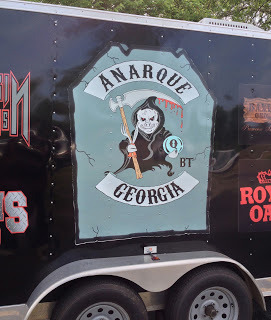
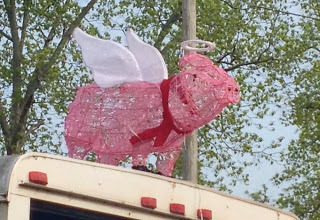
Anarque vs Heavenly Hawgs!
The Grim Reaper certainly did come for a lot of pigs this weekend; let’s just hope that they’ve all earned their wings and joined this little pink angel. :D
The festival is actually part of the competitive barbecue-cooking circuit; who knew there was such a thing? Each team also tries to outdo each other with clever names. Look at the juxtaposition of these two teams, barely a hundred yards from one another.


Anarque vs Heavenly Hawgs!
The Grim Reaper certainly did come for a lot of pigs this weekend; let’s just hope that they’ve all earned their wings and joined this little pink angel. :D
Published on April 27, 2013 08:37
April 22, 2013
Aargh! Lessons learned: stupid mistakes I've already made with my first indie book
Sometimes I think I'm not obsessive enough. The past two weeks I've downloaded so many different proofs of my new book, both print and digital; made so many changes both large and small; and had to resubmit the manuscript so many times for review that I had begun to think that I had some neurotic block against actually publishing this book.
And then within only a few hours of finally submitting it, and announcing it to the world on this blog, my website, and a brand new Facebook Author page, I belatedly did something I should have done weeks ago.
What was that? I did a title search of my book on Amazon.
Guess how many books with the title of Spontaneous Combustion there are? At least six. Six!
And to make it even worse, one of those books, which was just published last month by another indie author, obviously used the same CreateSpace cover template that I did. Yes, we both had tweaked the template, so the background photos are different, the color scheme is different, and I had chosen a slightly different font. But the covers still look like fraternal twins.
Aiyee! Why in the world didn't I take this small step a month ago? Can you say s-t-u-p-i-d?
Now titles can't be copyrighted, so that's not the problem. And thank goodness for subtitles, because they differentiate the two books as well. Finally, our books are in two very different genres. Mine is non-fiction about the craft of writing; the other book with the too-similar cover is an anthology of short stories.
So all is not lost. But I feel incredibly dumb. This must be a classic rookie mistake. I should have done a title search well before I published my book. I doubt I would have changed the title; it fits my book perfectly, and I can't imagine calling it anything else. But I might have chosen a different cover. Or better yet, invested in a cover designed by a professional.
Let this be the first chapter of my next book, tentatively entitled, Don't Do What I Did: Confessions of an Indie Idiot.
And then within only a few hours of finally submitting it, and announcing it to the world on this blog, my website, and a brand new Facebook Author page, I belatedly did something I should have done weeks ago.
What was that? I did a title search of my book on Amazon.
Guess how many books with the title of Spontaneous Combustion there are? At least six. Six!
And to make it even worse, one of those books, which was just published last month by another indie author, obviously used the same CreateSpace cover template that I did. Yes, we both had tweaked the template, so the background photos are different, the color scheme is different, and I had chosen a slightly different font. But the covers still look like fraternal twins.
Aiyee! Why in the world didn't I take this small step a month ago? Can you say s-t-u-p-i-d?
Now titles can't be copyrighted, so that's not the problem. And thank goodness for subtitles, because they differentiate the two books as well. Finally, our books are in two very different genres. Mine is non-fiction about the craft of writing; the other book with the too-similar cover is an anthology of short stories.
So all is not lost. But I feel incredibly dumb. This must be a classic rookie mistake. I should have done a title search well before I published my book. I doubt I would have changed the title; it fits my book perfectly, and I can't imagine calling it anything else. But I might have chosen a different cover. Or better yet, invested in a cover designed by a professional.
Let this be the first chapter of my next book, tentatively entitled, Don't Do What I Did: Confessions of an Indie Idiot.
Published on April 22, 2013 17:00
April 21, 2013
My new book, Spontaneous Combustion, is here!
I finally managed to pry the manuscript out of my fearful perfectionist hands, and hit the "publish" button. My first indie project, "Spontaneous Combustion,” is now officially a book! I’d set my birthday as a deadline, to force myself to finally let go of after revising and proofing it umpteen times. And I just made the deadline: whew!
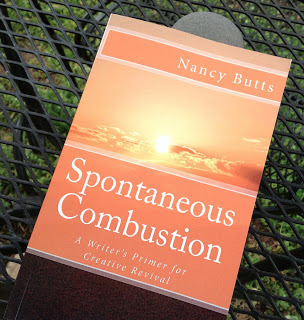
It’s more of a why-to book on writing than a how-to; a kind of tent revival for writers in the creative doldrums. I hope the book follows its own advice: to see the worth and meaning in what we do as writers without taking ourselves too seriously in the process. So I mock myself, and make some unusual suggestions in the book that I’m fairly sure you won’t find in any other book on writing. [See chapters 7 and 8 for these.]
It should be available for download tonight [April 21st] as a Kindle book, with the print version arriving on Amazon by the end of the week.
I’ve already had my first request for a Nook version. Because I’m participating in what Amazon calls the Kindle Select program, I can’t sell the e-book anywhere else: not even on my own website. Sorry Nook and iPad users (of which I am one myself). But the exclusivity only lasts 90 days, so I’ll have the option then to move back to the regular Kindle program, which would permit me to sell anywhere, including Barnes and Noble and the iTunes bookstore.
So if you are interested in a Nook or iPad version, please let me know in the comments.
In the meantime, you can always read the Kindle version using one of Amazon’s free Kindle reading apps, or even online in your web browser using Amazon’s Kindle Cloud Reader. Because I chose not to put DRM protection on the e-book version, you can even use a piece of freeware called Calibre to convert the Kindle book to a format that you can then load onto your Nook or iPad. That's what I do. So non-Kindle users aren't left out in the cold, I promise.

It’s more of a why-to book on writing than a how-to; a kind of tent revival for writers in the creative doldrums. I hope the book follows its own advice: to see the worth and meaning in what we do as writers without taking ourselves too seriously in the process. So I mock myself, and make some unusual suggestions in the book that I’m fairly sure you won’t find in any other book on writing. [See chapters 7 and 8 for these.]
It should be available for download tonight [April 21st] as a Kindle book, with the print version arriving on Amazon by the end of the week.
I’ve already had my first request for a Nook version. Because I’m participating in what Amazon calls the Kindle Select program, I can’t sell the e-book anywhere else: not even on my own website. Sorry Nook and iPad users (of which I am one myself). But the exclusivity only lasts 90 days, so I’ll have the option then to move back to the regular Kindle program, which would permit me to sell anywhere, including Barnes and Noble and the iTunes bookstore.
So if you are interested in a Nook or iPad version, please let me know in the comments.
In the meantime, you can always read the Kindle version using one of Amazon’s free Kindle reading apps, or even online in your web browser using Amazon’s Kindle Cloud Reader. Because I chose not to put DRM protection on the e-book version, you can even use a piece of freeware called Calibre to convert the Kindle book to a format that you can then load onto your Nook or iPad. That's what I do. So non-Kindle users aren't left out in the cold, I promise.
Published on April 21, 2013 09:00
April 20, 2013
When words fail
Along with the rest of the country, I've watched in shock and sorrow all week since the explosions at the Boston Marathon. A friend of mine was running, but since she finished about 25 minutes earlier, she and her family were out of the blast zone when it occurred. Thank goodness.
Faces haunt me: the faces of those who died, of those who were so cruelly injured, of the people who love them and are suffering with them. And yes, the faces of the two young men whom we believe (or at least hope) were solely responsible for this terrible act.
I'm a writer, but this is one of those times when I think that words fail us. There are no words that can adequately plumb the grief and horror so many people are trying to endure right now.
And there is no word that can explain to us why these two bombers were able to do what they did. One of them is the father of a three-year-old girl himself; how could he kill and maim other children? The other was, by the account of everyone who knew him, a kind young man who even volunteered to help people with Down's Syndrome.
I don't know if that factoid is true, but as we struggle to understand how people could perpetrate such a heinous act, we resort to two words over and over: evil and insanity. In my view, neither word explains a thing. They are simply labels we use to try to comprehend what is incomprehensible. It doesn't help me grasp how one person could unleash such unspeakable violence on others to call him evil; that begs the questions of what evil is, and how he succumbed to it in the first place. Calling him twisted or psychopathic or sociopathic or radicalized doesn't help me either. Again, how does someone who seemed to fit into society for so long suddenly whip around and reveal a wholly different face?
Evil, insanity—neither word helps me make sense of tragedy. They merely open the door to other mysteries.
In the end, I think we have to accept that we will never truly understand how human beings—who are capable of such courage and compassion, as so many others have demonstrated in Boston all this week—can also be capable of such cruelty. The best we can do is bind up our wounds when it happens.
Faces haunt me: the faces of those who died, of those who were so cruelly injured, of the people who love them and are suffering with them. And yes, the faces of the two young men whom we believe (or at least hope) were solely responsible for this terrible act.
I'm a writer, but this is one of those times when I think that words fail us. There are no words that can adequately plumb the grief and horror so many people are trying to endure right now.
And there is no word that can explain to us why these two bombers were able to do what they did. One of them is the father of a three-year-old girl himself; how could he kill and maim other children? The other was, by the account of everyone who knew him, a kind young man who even volunteered to help people with Down's Syndrome.
I don't know if that factoid is true, but as we struggle to understand how people could perpetrate such a heinous act, we resort to two words over and over: evil and insanity. In my view, neither word explains a thing. They are simply labels we use to try to comprehend what is incomprehensible. It doesn't help me grasp how one person could unleash such unspeakable violence on others to call him evil; that begs the questions of what evil is, and how he succumbed to it in the first place. Calling him twisted or psychopathic or sociopathic or radicalized doesn't help me either. Again, how does someone who seemed to fit into society for so long suddenly whip around and reveal a wholly different face?
Evil, insanity—neither word helps me make sense of tragedy. They merely open the door to other mysteries.
In the end, I think we have to accept that we will never truly understand how human beings—who are capable of such courage and compassion, as so many others have demonstrated in Boston all this week—can also be capable of such cruelty. The best we can do is bind up our wounds when it happens.
Published on April 20, 2013 05:41
April 13, 2013
Igniting and writing by firelight
Talk about spontaneous combustion!
Writing by firelight
This blog post by my former student Jenny Lundquist—author of Seeing Cinderella and the brand new Plastic Polly, both by Aladdin M!X—ties in beautifully both with the title of my blog, and with the title of my forthcoming book. [More about that tomorrow, I hope!]
I never would have thought of writing by firelight, and not just because I'd set the chimney on fire if I tried to use the tiny coal-burning fireplaces in my Victorian house. But since the power is always going out in the little town where I live, maybe I should try something like it. It seems like a wonderful way to tease yourself out of a stubborn block.
Writing by firelight
This blog post by my former student Jenny Lundquist—author of Seeing Cinderella and the brand new Plastic Polly, both by Aladdin M!X—ties in beautifully both with the title of my blog, and with the title of my forthcoming book. [More about that tomorrow, I hope!]
I never would have thought of writing by firelight, and not just because I'd set the chimney on fire if I tried to use the tiny coal-burning fireplaces in my Victorian house. But since the power is always going out in the little town where I live, maybe I should try something like it. It seems like a wonderful way to tease yourself out of a stubborn block.
Published on April 13, 2013 06:08
April 11, 2013
Pollen blizzard!
Pollen blizzard! That's what we get instead of snow. And it's inspired an idea for a new dystopian novel. How about this?
In a world where pollen storms rage for months at a time, only the hardy few who had stockpiled Kleenex and Claritin survive.
There are some compensations, however. Look at this photo that I took on my iPhone of the wisteria in my neighbor's yard: lovely!
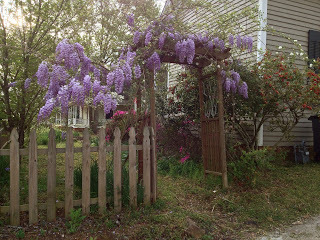
In a world where pollen storms rage for months at a time, only the hardy few who had stockpiled Kleenex and Claritin survive.
There are some compensations, however. Look at this photo that I took on my iPhone of the wisteria in my neighbor's yard: lovely!

Published on April 11, 2013 06:22

